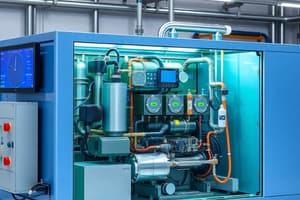Podcast
Questions and Answers
What is the reactant that is oxidised electrochemically within a fuel cell?
What is the reactant that is oxidised electrochemically within a fuel cell?
- Hydrogen (correct)
- Electrolyte
- Alkaline
- Oxygen
What is the product formed in the overall reaction of a hydrogen fuel cell?
What is the product formed in the overall reaction of a hydrogen fuel cell?
- Alkaline
- Oxygen
- Hydrogen peroxide
- Water (correct)
What is the purpose of connecting cells together in series in a battery?
What is the purpose of connecting cells together in series in a battery?
- To decrease the reaction rate
- To change the type of electrode
- To reduce the voltage
- To increase the voltage (correct)
Why do chemical reactions stop in non-rechargeable cells and batteries?
Why do chemical reactions stop in non-rechargeable cells and batteries?
What is required to reverse the chemical reactions in rechargeable cells and batteries?
What is required to reverse the chemical reactions in rechargeable cells and batteries?
What type of battery is non-rechargeable?
What type of battery is non-rechargeable?
Flashcards are hidden until you start studying
Study Notes
Fuel Cells
- Fuel cells are supplied by an external source of fuel (e.g. hydrogen) and oxygen or air
- Fuel is oxidised electrochemically within the fuel cell to produce a potential difference
- Hydrogen fuel cells involve the oxidation of hydrogen to produce water as the overall reaction
Cells
- Cells contain chemicals that react to produce electricity
- Voltage produced by a cell depends on factors such as electrode and electrolyte type
- A simple cell can be made by connecting two different metals in contact with an electrolyte
Batteries
- Batteries consist of two or more cells connected together in series to provide a greater voltage
- Non-rechargeable cells and batteries: chemical reactions stop when one of the reactants is used up
- Alkaline batteries are non-rechargeable
- Rechargeable cells and batteries: chemical reactions are reversed when an external electrical current is supplied
Studying That Suits You
Use AI to generate personalized quizzes and flashcards to suit your learning preferences.



